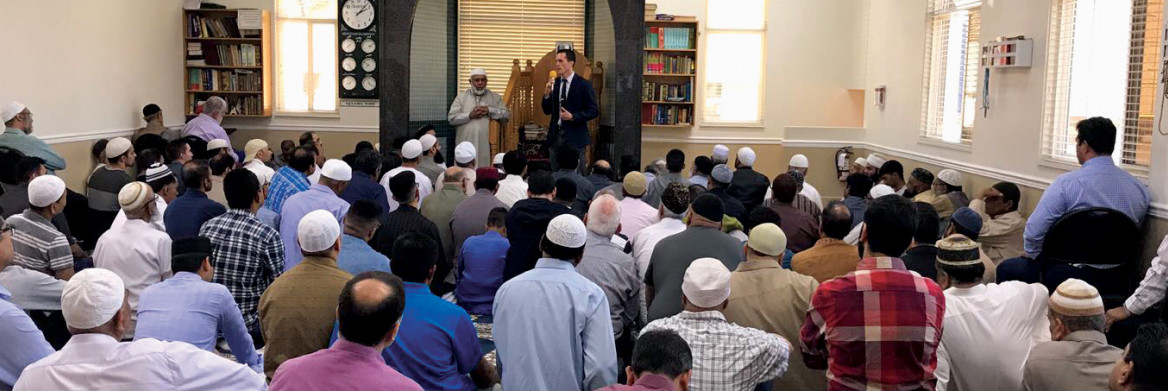Related link
Side by side, two police officers stand at the front of a mosque addressing the crowd on a Friday night during the holy month of Ramadan.
The police officers, RCMP Cpl. Anthony Statham and New Westminster Police Department Det.-Cst. Gareth Blount, are members of the British Columbia (B.C) Hate Crime Team. Their message is simple. "We want you to know we're here for you from a policing standpoint," says Statham. "We want you to report these incidents so we can track them and investigate them.
"
According to a recent Statistics Canada report, while police-reported hate crimes decreased in Canada from 2013 to 2015, hate crimes against Muslim Canadians more than tripled during the same period, going from 45 to 159.
Statham believes there are even more incidents that have gone unreported.
This crime trend prompted the team to launch an initiative to attend mosques and Muslim prayer centres across B.C. and let the community know that police can help.
"They need outreach from the police and they're coming from places where police aren't necessarily trusted,
" says Statham. "It's our obligation to make an effort to get out and have contact with the community to tell them about hate crimes, the police and to be that positive presence.
"
A complicated crime
The Hate Crime Team is the only one of its kind within the RCMP.
The two full-time police officers on the team investigate hate crimes as well as assist police officers in B.C. and across the country on cases where it's believed hate, prejudice or bias is a motivating factor in a criminal incident.
"Hate crime is not an area that's very well known,
" says Blount. "I think there's no such thing as a typical hate crime because of the complex effect they have on both the individual and the community.
"
In Canada, there are criminal incidents that may be motivated by hate. In these cases, people are charged with a specific crime, like assault or uttering threats. However, Crown Counsel can ask to have a hate crime designation applied to the case, which can result in a stiffer sentence.
Then there are the separate sections in the Criminal Code of Canada that are deemed hate crimes in their own right: hate propaganda, public incitement of hatred and mischief relating to religious property.
"We're seeing hate propaganda a lot online now,
" says Blount. "This typically involves putting forth views that vilify an identifiable group or individuals from a group based on their religion, ethnic origin, sexual orientation or other unique factors.
"
But in addition to investigating hate crimes, the team is focused on outreach.
Since the team first started this initiative during Ramadan in 2017 (May 27 to June 25), they've already spoken to more than 2,500 people across the province. Speaking engagements have often been delivered in conjunction with Metro Vancouver Transit Police, a key partner in hate crime awareness.
In order to reach the community, police have partnered with Islam Unravelled — an educational project that presents a positive and accurate image of Islamic beliefs — to help connect them with mosques and prayers centres.
Building relationships with the Muslim community is key to increase reporting since members of the community tend to be wary of police, says Tariq Tyab, from Islam Unravelled.
"Often in the Muslim community, people are reluctant to engage police in their home countries because it could cause them more problems than it could solve,
" says Tyab.
He says the outreach initiative is changing people's perception of police in Canada.
"People are paying attention because they're worried about their families,
" says Tyab. "They're being put at ease by meeting the police and realize they need to report a hate crime, even something they feel is small, and can do so without fear.
"
There are always a number of people who approach Blount and Statham after the presentation to chat, share their experience, shake their hands and thank them.
"There really is no substitute for getting out and talking to people,
" says Blount. "We have the opportunity to do that — talk to people face to face — and deliver a positive message: together we can make a difference.
"
